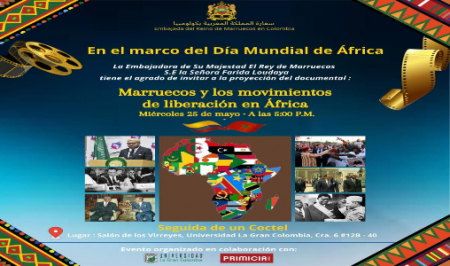Morocco Remains Committed to African Countries’ Unity, Territorial Integrity – Ambassador
Morocco, a country attached in all circumstances to its African roots, remains committed to the unity and territorial integrity of African countries, the continent’s socio-economic development and the promotion of its food security, said Moroccan Ambassador to Colombia Farida Loudaya. Morocco’s action in favor of the African continent “is based on the triptych consisting of the defense of the unity and territorial integrity of countries, development issues and projects to fight against poverty and all forms of extremism and the promotion of food security,” said Loudaya, who spoke at a ceremony organized by the Moroccan embassy to celebrate the World Africa Day. The ceremony was highlighted by the presence of the President of the Andean Parliament, parliamentarians, ambassadors, senior officials of the Colombian Ministry of Foreign Affairs, academics and journalists. The Moroccan diplomat reviewed various historical milestones of the process of African integration in which Morocco has played a leading role, citing the African Conference chaired on January 4, 1961 in Casablanca by the late HM Mohammed V, which laid the foundation for the creation, two years later, of the Organization of African Unity (OAU), which became the African Union (AU) in 2002. The involvement of the Kingdom continued with the late King Hassan II, who always defended an ambitious and futuristic pan-African project, a dynamic maintained by HM King Mohammed VI, since his accession to the Throne in 1999, she added. To illustrate this commitment, it is enough to recall the more than 50 visits made by the Sovereign since 2000, marked by the signing of a thousand cooperation agreements covering different areas, said the Moroccan ambassador to Colombia. Thus, Morocco, with its good air connectivity, its many trade agreements with various countries and its commitment to sustainable development of the African continent, has become the first investor in West Africa and the second in the whole continent, noted Loudaya. In addition, Morocco was one of the first countries to participate in peacekeeping operations in Africa, under the auspices of the United Nations, and now has thousands of peacekeepers in the Central African Republic and the Republic of the Congo, she said. In the religious field, Morocco has intensified its cooperation in recent years with African countries, sharing its experience in the fight against extremism and the exploitation of religion for political purposes. The Mohammed VI Foundation of African Ulemas plays in this wake an important role in the training of imams in an approach that promotes a moderate, open and tolerant Islam, said the diplomat. On the other hand, following the example of Colombia, which has always been a land of welcome for immigrants, Morocco, which hosts the African Migration Observatory, adopts a migration policy that advocates openness, welcome and integration, granting immigrants the same rights enjoyed by Moroccans, with the regularization of the situation of more than forty thousand Africans to date, she said. The Kingdom, continued Loudaya, has indeed advocated South-South cooperation, deploying an economic, cultural, humanitarian and religious diplomacy that places the interests of African citizens at the center of its priorities, with a vision based on peace, security and development. It is in this sense that HM King Mohammed VI has always supported the emergence of a new Africa, strong and bold, but especially an influential Africa in the concert of nations, an Africa master of its destiny, she concluded.

